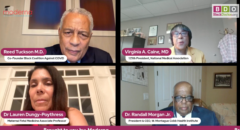
The U.S. Food and Drug Administration granted full approval for Pfizer's coronavirus vaccine on Monday. The approval is likely crucial for greater vaccine uptake and getting people more comfortable with the idea of getting vaccinated, especially with booster shots on the horizon. As we've reported before, despite the misinformation about hesitancy, more and more Blacks are getting vaccinated. The surge of the Delta variant has also played an important role in getting more people vaccinated.
READ: New Study Shows Blacks Vaccination Rates Much Higher Than Publicized
"The FDA's approval of this vaccine is a milestone as we continue to battle the COVID-19 pandemic," Acting FDA Commissioner Dr. Janet Woodcock says in an agency news release. "While this and other vaccines have met the FDA's rigorous, scientific standards for emergency use authorization, as the first FDA-approved COVID-19 vaccine, the public can be very confident that this vaccine meets the high standards for safety, effectiveness, and manufacturing quality the FDA requires of an approved product."
U.S. health officials hope the decision will trigger more vaccine mandates and boost vaccination rates among Americans who remain hesitant about immunization, The New York Times reports.
"While millions of people have already safely received COVID-19 vaccines, we recognize that for some, the FDA approval of a vaccine may now instill additional confidence to get vaccinated," Woodcock says. "Today's milestone puts us one step closer to altering the course of this pandemic in the U.S."
As students prepare to return to college campuses across the country, some, like Indiana University, already require vaccines for students. But others, like the University of Memphis, will likely only pursue a vaccine mandate when coronavirus vaccines gain full federal approval, the Times reports.
READ: Early Data Shows Rise in Breakthrough Infections Among the Vaccinated
Speaking to CNN on Sunday, U.S. Surgeon General Dr. Vivek Murthy said he thought full FDA approval would definitely have a significant impact on millions of Americans who remain vaccine-hesitant.
"This may tip them over toward getting vaccinated," he says, adding that he expects companies, governors and schools to use the full FDA approval to impose vaccine mandates. "We already know that there are many businesses and universities that have moved toward vaccine requirements."
About 60% of eligible people in the United States are now fully vaccinated, according to figures from the U.S. Centers for Disease Control and Prevention.
Three in 10 unvaccinated adults said they would be more likely to get vaccinated if
one of the vaccines currently authorized for emergency use was to receive full approval from the FDA, according to a June poll by the Kaiser Family Foundation.
The Pentagon also plans to make COVID-19 vaccinations mandatory for the country's 1.3 million active-duty troops by the middle of next month or when the FDA gives full approval to the vaccine, whichever comes first.
READ: U.S. to Recommend Booster Shots for Most Americans
For the 45 percent of unvaccinated Americans who have steadfastly said they will not get the vaccine, full approval will likely prompt new restrictions, including limitations on employment and an increase in health insurance premiums, the Times reports.
Some states and municipalities could follow the lead of New York City, which will soon require at least one vaccine dose for those seeking to enter indoor restaurants, gyms or cultural events.
The FDA updated its authorizations of the Pfizer and Moderna vaccines last week to allow third "booster" doses for some immunocompromised people, a decision backed by the CDC.
Regulators are still reviewing Moderna's application for full approval for its vaccine, and a decision could come at least several weeks after the one for Pfizer. Moderna is planning to submit its data in support of a booster shot in September, the Times reports.
For more information about the COVID-19 vaccines, visit the CDC.









